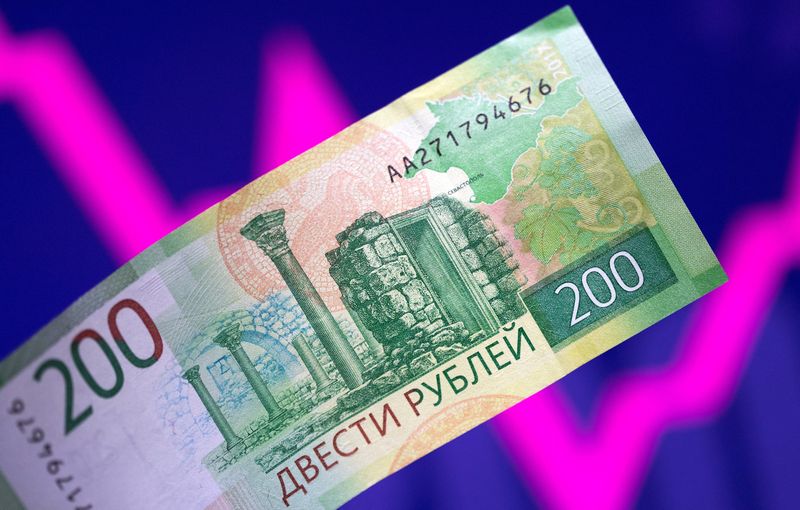By Sinead Cruise and Carolina Mandl
LONDON/NEW YORK (Reuters) - Global investors are losing confidence in securities linked to shares of companies in the world's geopolitical hot spots, investors and analysts said, after Moscow moved to de-list Russian depositary receipts from foreign exchanges in retaliation for Western sanctions over the war in Ukraine.
Moscow's actions have deprived many foreign investors of the ability to trade in Russian securities, including depositary receipts. Investors are worried about future copycat actions by other governments who might look to reduce foreign influence over their leading companies.
Depositary receipts, or DRs, are certificates issued by a bank representing shares in a foreign company traded on a local stock exchange.
DRs reduce currency and liquidity risk for buyers, who see them as one of the surest ways to invest in companies in countries ranging from Brazil to China.
But events in Russia have forced many investors to write down the value of depositary receipts of Russian companies to zero, given their inability to trade them. Investors and analysts now wonder if future geopolitical tensions could lead to similar reactions by other governments and if those risks are accurately reflected by current prices.
"Political instability and rapidly shifting geopolitical alliances can, in a very short amount of time, result in frozen and inaccessible capital," Peter C. Earle, economist with American Institute for Economic Research, told Reuters.
"It's long past time for investors to begin to consider the intersection between three variables: the size of their exposure to foreign securities, the likely return on those issues over time, and the potential for conflict," Earle said.
Data from Citigroup (NYSE:C) shows $2 trillion in DRs were traded in the first half of 2023. Companies raised $4.7 billion in the first half of this year, versus $2.8 billion in the same period of 2022, from selling DRs, according to Citi. Activity was muted last year following a downturn in the overall equity markets.
Among the 10 most traded DR programs in 2022, five were issued by Chinese companies.
"Portfolio globalization and diversification continues despite geopolitical concerns in select markets and sectors," Citigroup told Reuters at the end of July. CONSEQUENCES
Loss of confidence in DRs could drain needed foreign capital from firms in emerging economies, for instance. Some advisers said global banks that issue DRs should better spell out potential risks to investors, who tend to buy DRs for global portfolios offering diversified exposure to several companies and countries.
Investors seeking to outperform broad stock market returns should still consider eliminating or reducing exposure to countries at war, or unstable governments, some advisers said.
"The geopolitical risk of owning a GDR (global depositary receipt) right now is under-appreciated by most western investors ... GDRs should now be viewed as riskier, investors should reassess allocation levels and require a risk premium," said Christopher Day, managing director of U.S.-based Doliver Advisors, which manages around $500 million in assets for high net worth individuals.Michael Ashley Schulman, partner, chief investment officer at Running Point Capital Advisors, said some individuals may have "missed or forgotten the legal and jurisdictional exposure of GDRs", since thrown into sharp relief by turmoil in Russia.
In Moscow, a court on Aug. 7 sequestered all Russian stocks owned by Goldman Sachs (NYSE:GS) III SICAV fund, including its 5% stake in Russia's largest toy retailer, Detsky Mir, at the request of Otkrytie bank, which says Goldman owes it 615 million roubles, court documents showed.
Otkrytie said Goldman Sachs cited sanctions introduced by the United States and Britain over Moscow's war in Ukraine in failing to settle the debt. Goldman declined to comment.
"GDRs have always faced political and regulatory risk —this has always been a known hazard— but investors are just now getting another wakeup call or reminder of this possibility," said Schulman, who advises wealthy families on capital allocation.
Moscow's sudden shakedown turned one of the most appealing features of DRs into a major flaw: investors own the shares only indirectly, said Grzegorz Drozdz, market analyst at investment firm Conotoxia Ltd.
"There is always the threat of a possible ban or restriction of trading in such instruments on GDRs listed in other jurisdictions," he said.
Malcolm Dorson, senior portfolio manager at Global X, which manages around $40 billion in assets, said he believed Russia was an extreme case and losses sustained by Russian DR holders were unlikely to trigger a lengthy retreat from other DR markets globally.
But investors would be wise to review their risk tolerance.

"Big picture, DR programs do carry slightly more risk than a regular equity security because of that additional layer between the companies and investors," he said.
"In a normal situation, governments and the companies under their jurisdictions are actually incentivized to keep DR investors happy because DRs allow international investors to access markets, and hence provide these companies access to capital and investment into their countries."